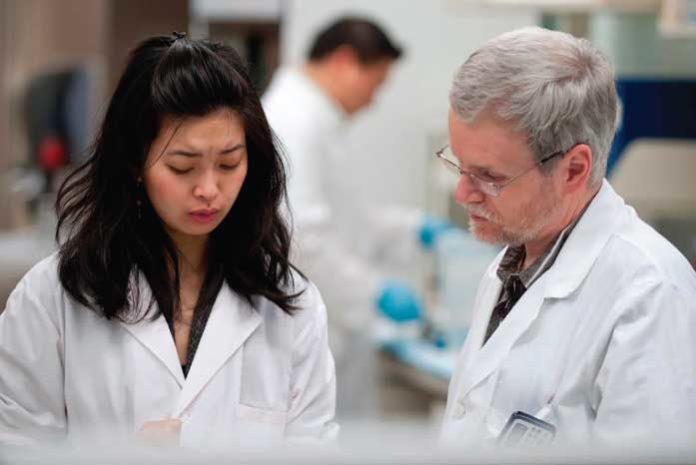 Hamilton is an urban hotbed for life sciences research and development. Renowned for its nimbleness and deep collaboration between its life sciences institutions and business sector, it transforms the lives of people around the world.
Hamilton is an urban hotbed for life sciences research and development. Renowned for its nimbleness and deep collaboration between its life sciences institutions and business sector, it transforms the lives of people around the world.
The life sciences focus in Hamilton ranges from award-winning laboratory science and clinical trials to health policy development and product development – delivering a truly global impact.
 Research in Hamilton is enriched by a comprehensive network – the Synapse Consortium, brings together a network of world-class research institutions and life sciences-related business organizations all based in Hamilton. McMaster University, its academic health science centre partners Hamilton Health Sciences, St. Joseph’s Healthcare Hamilton, and Mohawk College together form an integrated and nimble engine for research that has placed Hamilton at the forefront of life sciences developments for more than 50 years. Collaboration between these organizations unifies a diverse range of expertise – creating a unique platform for life sciences development unlike any other in Canada.
Research in Hamilton is enriched by a comprehensive network – the Synapse Consortium, brings together a network of world-class research institutions and life sciences-related business organizations all based in Hamilton. McMaster University, its academic health science centre partners Hamilton Health Sciences, St. Joseph’s Healthcare Hamilton, and Mohawk College together form an integrated and nimble engine for research that has placed Hamilton at the forefront of life sciences developments for more than 50 years. Collaboration between these organizations unifies a diverse range of expertise – creating a unique platform for life sciences development unlike any other in Canada.
McMaster University is ranked within the top 50 universities in the world for medical and health research and education by several international ranking systems. Hamilton Health the lives of thousands of people in the event of a global pandemic. McMaster’s Michael G. DeGroote Institute for Infectious Disease Research is at the forefront of developing innovative diagnostic practices as well as novel antimicrobial and antibiotic agents – working to detect and address these threats – such as tuberculosis, SARS and other respiratory diseases.
The Synapse Life Science Consortium unifies a diverse range of expertise via renowned Hamilton-based institutions and organizations The McMaster Stem Cell and Cancer Research Institute, which investigates the underlying cellular and molecular origins of human cancer, has developed a drug screening program that uses reprogrammed pluripotent stem cells to identify novel therapies for conditions from malignancy to neuropathies including pain.
Across Hamilton, researchers are also working on identifying the role of gut bacteria or microbiota in the maintenance of health, including the brain.The Farncombe Family Institute for Digestive Health Research at McMaster University is finding the links between intestinal conditions and both chronic functional and inflammatory intestinal disorders including gluten sensitivity and psychiatric disorders such as depression and anxiety. Research teams at Hamilton Health Sciences and St. Joseph’s Healthcare Hamilton are also studying the connection between probiotics and the brain.
Through the development of novel diagnostics and treatments on the leading edge of science, the work of Hamilton life sciences researchers begins at the lab bench and ends with saving the lives of people most in need of care around the world.

Visit www.synapselifescience.com.
















